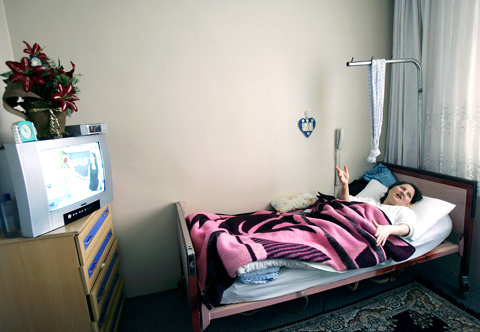Emine Yaman lies in bed, her legs rigid, her feet prone to sores and swelling. Paralyzed by a bullet her husband fired into her chest, she is the face of domestic violence in a country still struggling to discard long-held cultural practices that denigrate women.
She wears diapers and reaches for a knotted sheet hanging from an overhead bar to shift her upper body. The weak bones in her 40-year-old hips, knees and left arm have broken since the shooting in 1999. Infections induce fevers and she takes antibiotics. A municipal doctor sometimes visits her bare apartment beside a highway in Turkey’s biggest city.
Virtually abandoned by her family, she lives on the kindness of strangers.

PHOTO: AP
Her husband, Ahmet, who did a short stint in jail for shooting her, has filed for divorce, saying she was aggressive. He lives with their teen-age son and daughter in his home province of Giresun on the Black Sea coast.
DIVORCE?
Emine rarely talks to her children, and gets some consolation from refusing to divorce.
“He left me like this,” she said. “Should I divorce him and make him feel comfortable?”
Turkish media and activists have cited Emine Yaman’s story as an extreme example of the consequences of domestic violence in the secular state of more than 70 million people, mostly Muslims. The recent murder of an Italian peace activist hitchhiking in a wedding gown renewed debate about the problem. A man was charged with the killing.
Turkey is still grappling with the issue of violence against women in a largely patriarchal society where the old expressions go: “A beating comes from paradise” and “Don’t keep her without a stick on her back and a baby in her belly.” So tolerable is abuse that in the 1990s, a TV comedy show featured a character who was constantly beaten up by her husband.
Last year, a Turkish survey of 1,800 married women found that one in three was a victim of domestic abuse. Some global estimates are similar.
Turkey has struggled to curb “honor killings,” murders of women deemed to have tarnished the reputation of their relatives, sometimes by having a premarital affair or a child out of wedlock.
DISCRIMINATORY LAWS
Pressed by women’s groups and the EU, which the country hopes to join, Turkey removed many discriminatory laws, made rape within marriage a crime and barred sexual harassment in the workplace in a 2005 penal code. Activists say enforcement is weak and police and judges need training.
Turkey is also educating thousands of police about domestic abuse with tutors and training videos and backed an awareness campaign on television.
Some women’s activists support the Islamic-oriented government’s efforts to lift curbs on the wearing of Muslim head scarves, which would make it easier for pious women to get state jobs and education. But they say authorities should devote as much time to domestic violence.
Turkish law requires municipalities of more than 50,000 people to open shelters for women, but many cities don’t provide such help. Traditionally, authorities discourage breakups and urge couples to resolve differences, a path that can prolong the abuse.

The Philippines yesterday said its coast guard would acquire 40 fast patrol craft from France, with plans to deploy some of them in disputed areas of the South China Sea. The deal is the “largest so far single purchase” in Manila’s ongoing effort to modernize its coast guard, with deliveries set to start in four years, Philippine Coast Guard Commandant Admiral Ronnie Gil Gavan told a news conference. He declined to provide specifications for the vessels, which Manila said would cost 25.8 billion pesos (US$440 million), to be funded by development aid from the French government. He said some of the vessels would

CARGO PLANE VECTOR: Officials said they believe that attacks involving incendiary devices on planes was the work of Russia’s military intelligence agency the GRU Western security officials suspect Russian intelligence was behind a plot to put incendiary devices in packages on cargo planes headed to North America, including one that caught fire at a courier hub in Germany and another that ignited in a warehouse in England. Poland last month said that it had arrested four people suspected to be linked to a foreign intelligence operation that carried out sabotage and was searching for two others. Lithuania’s prosecutor general Nida Grunskiene on Tuesday said that there were an unspecified number of people detained in several countries, offering no elaboration. The events come as Western officials say

A plane bringing Israeli soccer supporters home from Amsterdam landed at Israel’s Ben Gurion airport on Friday after a night of violence that Israeli and Dutch officials condemned as “anti-Semitic.” Dutch police said 62 arrests were made in connection with the violence, which erupted after a UEFA Europa League soccer tie between Amsterdam club Ajax and Maccabi Tel Aviv. Israeli flag carrier El Al said it was sending six planes to the Netherlands to bring the fans home, after the first flight carrying evacuees landed on Friday afternoon, the Israeli Airports Authority said. Israeli Prime Minister Benjamin Netanyahu also ordered

Former US House of Representatives speaker Nancy Pelosi said if US President Joe Biden had ended his re-election bid sooner, the Democratic Party could have held a competitive nominating process to choose his replacement. “Had the president gotten out sooner, there may have been other candidates in the race,” Pelosi said in an interview on Thursday published by the New York Times the next day. “The anticipation was that, if the president were to step aside, that there would be an open primary,” she said. Pelosi said she thought the Democratic candidate, US Vice President Kamala Harris, “would have done